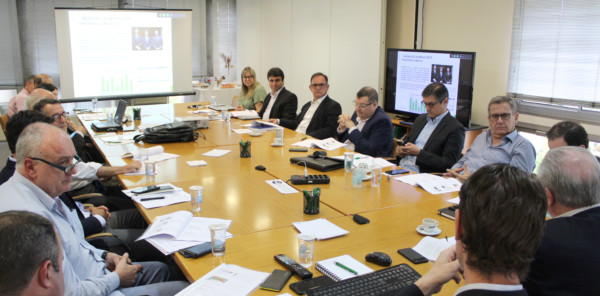
The Board of Directors of Cecafé – Brazilian Coffee Exporters Council met on Tuesday December 3rd at the Council headquarters in São Paulo (SP). The Council’s realized budget, partial audit and activity reports in 2019 were presented in the meeting, with highlight to the council’s institutional representation, market intelligence, legal issues, and its Sustainability and Social Responsibility pillar.
The strategic importance of such topics was evident by the attention and support shown by the members of Cecafé Board of Directors during the presentation of studies for the establishment of I-Cecafé – Brazilian Coffee Sustainability Institute. Such support was also made clear during the performance assessment of programs such as Informed Producer, Coffee Children at School, and Safe Coffee, as well as in actions directly supported by the export sector, such as Mesa Café Brazil and the member initiative directed to Using Pesticides Correctly and Safely.
The highlight of the sustainability pillar in the meeting was even clearer during the presentation of the work proposal for 2020, encompassing continuity of actions as well as new projects and previously structured partnerships.
Some of the actions to be continued include:
 Informed Producer – expansion of groups, by means of direct support from Incaper – Capixaba Institute for Research, Technical Assistance and Rural Extension. The Institute can hold Informed Producer courses in the regions of Matas de Minas Gerais and South Bahia;
Informed Producer – expansion of groups, by means of direct support from Incaper – Capixaba Institute for Research, Technical Assistance and Rural Extension. The Institute can hold Informed Producer courses in the regions of Matas de Minas Gerais and South Bahia;
 Good practices in the use of pesticides and waste monitoring: strengthening the workgroup that includes leader producers, consultants, exporters, roasters, accredited laboratories and public rural extension and research institutes;
Good practices in the use of pesticides and waste monitoring: strengthening the workgroup that includes leader producers, consultants, exporters, roasters, accredited laboratories and public rural extension and research institutes;
The highlights in restructuring and new proposed actions include:
 Family succession in Brazilian coffee growing – project that focused on future coffee growers engaged in sustainability in a partnership between Neumann Foundation, Cecafé and Senar Minas – National Rural Learning Service. A similar initiative is being developed by the Department of Agriculture of Rondônia and Emater RO – Technical Assistance and Rural Extension Corporation of the State of Rondônia;
Family succession in Brazilian coffee growing – project that focused on future coffee growers engaged in sustainability in a partnership between Neumann Foundation, Cecafé and Senar Minas – National Rural Learning Service. A similar initiative is being developed by the Department of Agriculture of Rondônia and Emater RO – Technical Assistance and Rural Extension Corporation of the State of Rondônia;

Coffee Lifecycle Assessment Survey – action that involves ITAL – Food Technology Institute, Cecafé, and Guaxupé Exporting Co;
 Monitoring and assessing the impact of behavioral changes among participants of the Informed Producer program: in addition to program continuity and continuous improvement of control automation through the Initiative Portal, the aim is to assess the positive results and transformations resulting from coffee grower capacity building, such as adopting good farming practices, digital inclusion and compliance with regulations in environmental and labor areas;
Monitoring and assessing the impact of behavioral changes among participants of the Informed Producer program: in addition to program continuity and continuous improvement of control automation through the Initiative Portal, the aim is to assess the positive results and transformations resulting from coffee grower capacity building, such as adopting good farming practices, digital inclusion and compliance with regulations in environmental and labor areas;
 New Member Initiative in the Social area: partnerships with InPACTO – The National Pact to Eradicate Slave Labor and the Global Coffee Platform to expand best labor practices and strengthen dialogue among all links of the production chain;
New Member Initiative in the Social area: partnerships with InPACTO – The National Pact to Eradicate Slave Labor and the Global Coffee Platform to expand best labor practices and strengthen dialogue among all links of the production chain;

Pollinizers: assessment of possible partnerships for new projects with Robusta coffee growers.
As we approach the year end, we can say 2019 was a year of hard work, accomplishments and the support of the export sector. The year of 2020 looms a year full of opportunities and challenges for Brazil. With the support of its Board of Directors, Cecafé will continue its mission: moving on towards an increasingly sustainable and socially responsible future.
Marcos Matos – CECAFÉ CEO
Lilian Vendrametto – CECAFÉ Sustainability Manager


Leave A Comment